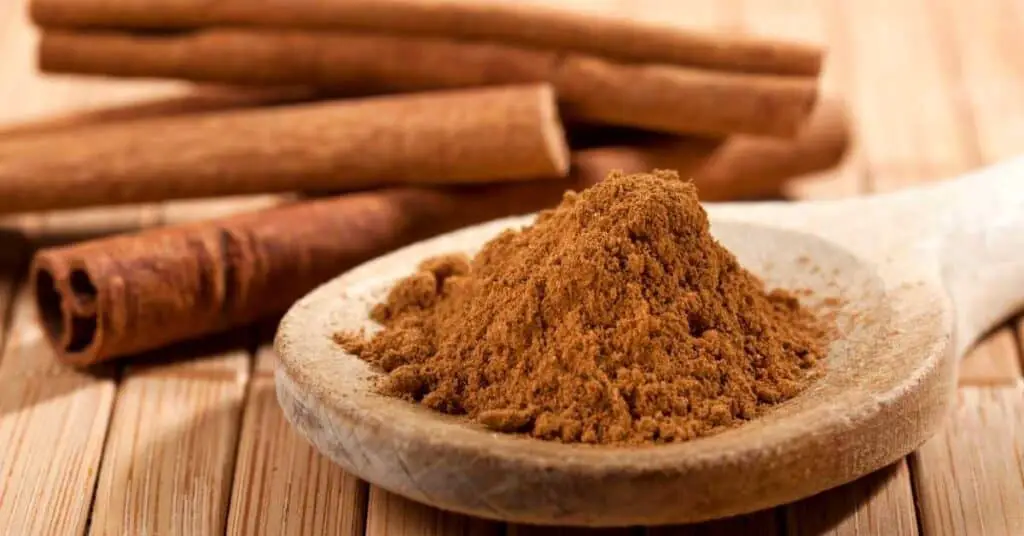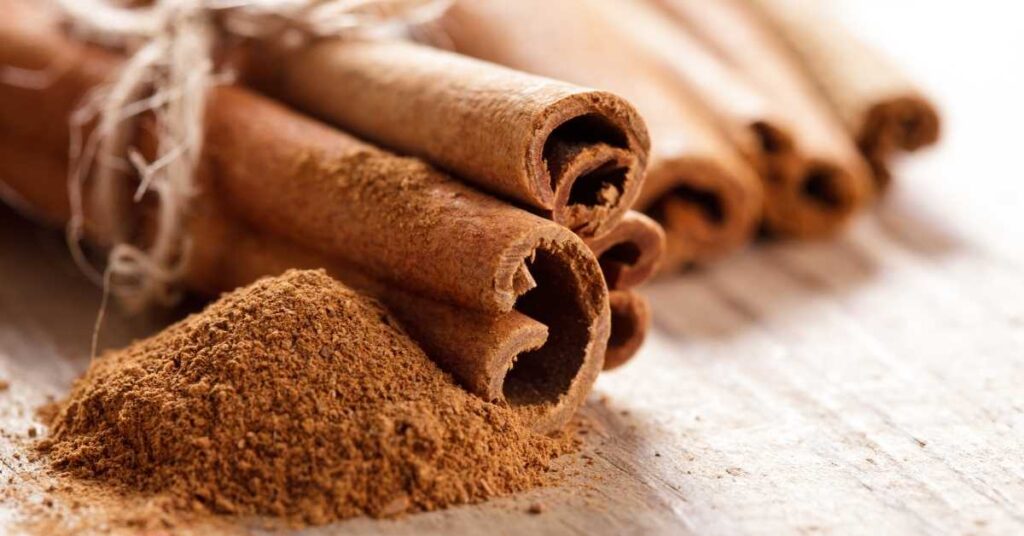Cinnamon is a spice that has been used for centuries in culinary dishes and as traditional medicine. Today, cinnamon is still enjoyed for its flavour and health benefits.
People consume cinnamon in a variety of ways. It can be used as a spice in cooking, added to beverages like tea or coffee, and even taken in supplement form. However, most people wonder what will happen if someone eats a spoonful of cinnamon.
When you eat a spoonful of cinnamon, your mouth will start to dry, and you’ll experience a warming sensation. Also, it will mostly get stuck in your throat area.
Want to find out more about what it is like to eat a spoonful of cinnamon?
Read this article to learn more about cinnamon, whether cinnamon is good to eat directly, the reason why cinnamon is hard to swallow, the bad impact of eating a spoonful of cinnamon, and whether consuming raw cinnamon is deadly.
You will also learn about the impact of cinnamon on your heart, how to consume cinnamon in moderation, the benefits and risks of cinnamon, and finally, different ways to consume cinnamon.
Cinnamon
Cinnamon is a sweet-smelling spice derived from the inner bark of trees in the genus Cinnamomum. It is used in many cuisines worldwide and is prized for its flavour and aromatic properties.
Cinnamon has a long history of use in traditional medicine, dating back to ancient Egypt, where it was used to treat various ailments, including colds, stomach aches and infections.
The taste of cinnamon is warm and sweet, with a slightly pungent aftertaste. It is often used to flavour baked goods, such as cakes, cookies and pies. Cinnamon can also be used to add flavour to savoury dishes, such as curries and stews.
Today, cinnamon is still used as a natural remedy for a variety of health conditions. It boosts immunity, relieves pain and inflammation, and improves digestion, and it has many more benefits.
Whether you’re cooking up a storm in the kitchen or looking for a natural way to improve your health, cinnamon is a great spice to have on hand.
Is it Good to Eat Cinnamon Straight?
Most people love the taste of cinnamon. It’s a popular spice that can be used in sweet or savoury dishes. But what about eating cinnamon on its own? Is it safe to eat cinnamon straight?
Cinnamon is made from the bark of certain types of trees. The bark is dried and ground into a powder. Cinnamon has a sweet, warm flavour and is used in many different cuisines around the world.
Cinnamon is safe to eat in small amounts. However, eating large quantities of cinnamon can be dangerous. Cinnamon contains a compound called coumarin, which can be toxic in large doses. Eating too much coumarin can cause liver damage or failure.
If you’re going to eat cinnamon straight, make sure you only consume a small amount. Eating too much cinnamon can be dangerous to your health. Stick to eating small amounts of cinnamon to enjoy its flavour without putting your health at risk.
YOUTUBE: https://www.youtube.com/watch?v=Yk7MzDWoRsg
Why Can’t You Swallow Cinnamon?
Cinnamon is a popular spice used in many different dishes, but you may have noticed that it’s not recommended to swallow cinnamon. In fact, swallowing cinnamon can be dangerous and even lead to death.
So, why can’t you swallow cinnamon? There are a few reasons. First, cinnamon is very dry and can absorb moisture from your mouth and throat, which can lead to dehydration.
Second, cinnamon is an irritant and can cause inflammation of the throat and esophagus. Finally, cinnamon can also interact with other medications you may be taking, making them less effective or even dangerous.
If you’re curious about why cinnamon is so dangerous, keep reading. We’ll explain everything you need to know about this popular spice.
How Deadly is Eating a Large Amount of RAW Cinnamon?
Most people think that cinnamon is a harmless spice that can be added to food for flavour or used in baking. However, eating a large amount of raw cinnamon can actually be deadly.
Cinnamon contains a compound called coumarin, which is toxic in large amounts. Coumarin can cause liver damage and failure, as well as other health problems. Symptoms of coumarin poisoning include nausea, vomiting, abdominal pain, and seizures. If you consume too much coumarin, it can be fatal.
So, while cinnamon may make your food taste good, eating too much of it can be deadly. Be sure to use it in moderation!
The Good And Bad Impacts of Cinnamon on Your Heart
Cinnamon has been used as a spice and flavouring agent for centuries. It is also known for its medicinal properties.
Cinnamon is rich in antioxidants and has anti-inflammatory and anti-bacterial properties. All these qualities make cinnamon good for your heart health.
Cinnamon can help lower bad cholesterol levels, reduce inflammation, and improve circulation. All these effects can help keep your heart healthy and reduce the risk of heart disease.
However, cinnamon can also have some side effects. Cinnamon can interact with certain medications, such as blood thinners and diabetes medications. Too much cinnamon can also lead to gastrointestinal issues like diarrhea, heartburn, and indigestion.
So, while cinnamon has some benefits for your heart health, you should be aware of its potential side effects as well. Talk to your doctor before adding cinnamon to your diet if you have any concerns.
The Safe Amount of Cinnamon to Consume Daily
Cinnamon is a delicious spice that can be used in many recipes. But did you know that cinnamon can also be good for your health? Cinnamon has been shown to help regulate blood sugar levels, improve cholesterol levels, and reduce inflammation.
So how much cinnamon should you consume each day to reap these health benefits? The answer is 1-2 grams (or about 1/2 teaspoon). That’s the recommended safe amount of cinnamon to consume each day.
So go ahead and enjoy cinnamon in your favourite recipes or sprinkled on top of your morning oatmeal. Just be sure to keep it within the recommended amount, and you’ll be reaping all the health benefits cinnamon has to offer!
The Real Benefits of Cinnamon
Cinnamon is one of the oldest spices known to man. It was used in ancient Egypt not only as a food flavouring but also as a medicine. Cinnamon was so highly prized that it was considered more valuable than gold.
Today, we still value cinnamon for its unique flavour and aroma. But did you know that this spice also has many health benefits?
Cinnamon is rich in antioxidants, which can help protect your body against cell damage and disease. Cinnamon has also been shown to have anti-inflammatory properties, which can be helpful in relieving pain and swelling.
This spice can also help regulate blood sugar levels, making it a good choice for diabetics or anyone who is trying to manage their blood sugar. And cinnamon has even been shown to boost cognitive function and memory.
So next time you’re looking for a little flavour boost, reach for some cinnamon. You may be surprised at how good it is for you!
YOUTUBE: https://www.youtube.com/watch?v=BG29xIk9KuY
The Hidden Risks of Cinnamon
While cinnamon is generally considered safe, there are some potential risks associated with its consumption. These include gastrointestinal problems, allergic reactions, and liver damage.
Cinnamon can cause gastrointestinal upset, such as stomach cramps, nausea, vomiting, and diarrhea. People who are allergic to cinnamon may experience symptoms such as hives, swelling, and difficulty breathing.
Cinnamon can cause liver damage in large doses. Therefore, it is important to consult with a healthcare provider before taking cinnamon supplements.
While the risks of consuming cinnamon are relatively low, it is important to be aware of them. If you experience any adverse effects after consuming cinnamon, please seek medical attention immediately.
YOUTUBE: https://www.youtube.com/watch?v=JXV_7t5wphc
The Best Ways to Consume Cinnamon
Cinnamon is a spice that has many benefits. It can be used to help regulate blood sugar, reduce inflammation, and even improve brain function.
The best way to consume cinnamon is by adding it to your diet in small amounts throughout the day. This can be done by sprinkling it on top of oatmeal or yogurt, stirring it into coffee or tea, or even adding it to baked goods.
If you’re looking for a more potent dose of cinnamon, you can take it in supplement form. Cinnamon supplements are available in capsules, tablets, and tinctures. It’s important to start with a lower dose and increase gradually to avoid side effects such as upset stomach or dizziness.
If you want to enjoy the flavour of cinnamon without the health benefits, you can use it in recipes for desserts, savoury dishes, or cocktails. Cinnamon goes well with sweet and savoury flavours alike, so get creative and experiment until you find your perfect combination.
Cinnamon is a versatile spice with many health benefits. By adding it to your diet in small amounts, you can reap the rewards of this delicious spice.
Frequently Asked Questions Related to Eating Spoonful of Cinnamon
1. Is a spoonful of cinnamon good for you?
A spoonful of cinnamon is good for you—in fact, it has a host of health benefits. For example, cinnamon can help cut the risk of heart disease by reducing bad cholesterol and inflammation.
However, it’s important to note that too much cinnamon can also be harmful. In high doses, it can cause cough, choking, and burning sensations in the throat. So enjoy a sprinkle of this fragrant spice in moderation!
2. Can You Swallow Cinnamon?
No, it is not even safe to swallow cinnamon. While small amounts of cinnamon may be ingested when used as a spice in recipes, it is not recommended to swallow cinnamon as it can be harmful.
When swallowed, cinnamon can cause irritation and swell to the throat and mouth tissues. It can also lead to difficulty breathing. In severe cases, swallowing cinnamon may result in death.
3. What is the best time to eat cinnamon?
Cinnamon can be enjoyed at any time of the day, but it is often thought to be most beneficial when consumed in the morning.
This is because cinnamon helps to regulate blood sugar levels, and keeping blood sugar levels stable throughout the day is key to maintaining optimal energy levels.
Additionally, cinnamon is a good source of antioxidants, which can help protect the body against free radicals that can cause cellular damage.












